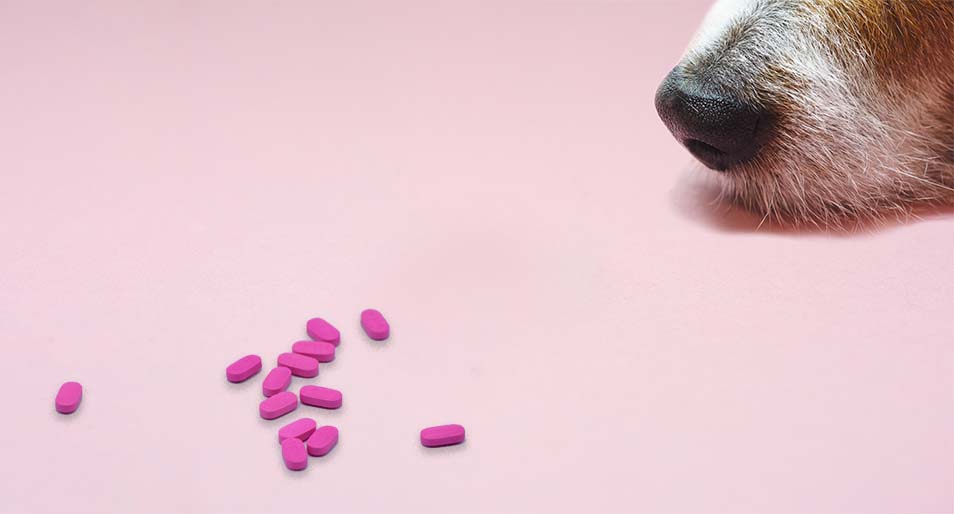PET HEALTH
With the arrival of spring and summer comes the onset of seasonal allergies. To help relieve sneezing, itching, watery eyes, and other symptoms, you may turn to BenadrylⓇ. While it’s common to treat our allergies with the medication, you may wonder if Benadryl is safe for dog allergies, too.
The short answer is yes, you can give your dog Benadryl. But it’s a little more complicated than just giving them the same form and dosage you take.
Benadryl is the brand name for diphenhydramine, an antihistamine that crosses the blood-brain barrier and blocks certain receptors in the body from registering histamines that are present.1 It can be used to relieve symptoms associated with various types of allergies, as well as travel anxiety and motion sickness.
Read on to learn more about what it can treat in dogs, when you shouldn’t give them the medicine, and how much Benadryl is safe for a dog.
A MetLife Pet Policy May Help Cover Allergy Treatment Costs
Can You Give Your Dog Benadryl?
If you’ve consulted your veterinarian first, Benadryl can usually be given to your dog at home.2 There are some instances when your dog shouldn’t have Benadryl, as it could make them more anxious, interfere with other medications, or complicate certain health conditions. So it’s important your vet weighs in before you give your pup a dose. Also, make sure you have the correct form and dosage (more on that later).
Is Benadryl Safe for Dogs?
Benadryl is typically safe for most dogs with the proper dosage — although, it’s not currently approved by the Federal Drug Administration (FDA) for veterinary use.1 While considered safe for most dogs, it may be best to avoid giving your dog Benadryl if they have any of these conditions:1,2
- Cardiovascular or lung diseases
- Glaucoma (an eye disease that causes the natural pressure in the eye to increase)
- High blood pressure
- Pregnancy
- Hypothyroidism (a condition when the thyroid is underactive and slows a dog’s metabolism)3
- Seizure disorders
Talk to your vet before giving your dog Benadryl to ensure none of these conditions apply, and make sure they won’t interfere with any medications your dog is on. Like with any new food or medication, watch your dog closely after you give them Benadryl to look for signs of adverse reactions.
What Can Benadryl Treat in Dogs?
Just like with humans, Benadryl can be given to dogs to help treat symptoms related to environmental and seasonal allergies, reactions to certain spider and insect bites, skin allergies that cause itching, and food allergies.
Benadryl can be used to help reduce allergy symptoms, including:1
- Runny eyes and nose
- Coughing and sneezing
- Redness
- Hives
- Inflammation and swelling
- Anaphylactic reaction
If your dog displays signs of a severe allergic reaction (facial swelling or difficulty breathing) before or after giving them Benadryl, take them to the vet immediately.
Can I give my dog Benadryl for anxiety?
You may have heard about pet parents using Benadryl to help calm their dogs due to its mild sedative properties. While it may work for some dogs, others may become more anxious after giving it to them.2 If your dog has travel anxiety or general anxiety, talk with your vet to come up with the right treatment plan for them.
Benadryl Dosage for Dogs
Each dog is different, so it’s best to check with your vet to see how much Benadryl you can give your dog. Some Benadryl may be mixed with other ingredients that are toxic to dogs — like alcohol or TylenolⓇ — so read the label and make sure the Benadryl or generic versions you give them only contain diphenhydramine.1,2
Experts recommend 2 – 4 milligrams (mg) of Benadryl per kilogram of body weight (or 0.9 – 1.8 mg per pound) every 8 – 12 hours.4,2 Using these numbers, and making it easier to remember, 1 mg of Benadryl per pound of body weight, given 2 – 3 times a day may be considered a practical dose.2 So if your dog weighs 20 pounds, 20 mg of Benadryl given 2 – 3 times a day may work. For more dosage recommendations, refer to the following chart:
Dog’s Weight |
Recommended Dosage |
Max Daily Dosage |
2 pounds |
2 mg |
6 mg |
12 pounds |
12 mg |
36 mg |
22 pounds |
22 mg |
66 mg |
32 pounds |
32 mg |
96 mg |
42 pounds |
42 mg |
126 mg |
52 pounds |
52 mg |
156 mg |
Children’s Benadryl for dogs
Children’s Benadryl pills have smaller dosages than adult pills, which may make it easier to adjust the dosage you need and be easier for your pup to swallow — especially if you have a small dog.2 Be sure to verify the correct dosage of children's Benadryl with your vet before giving it to your dog.
Benadryl to avoid
Veterinarians generally recommend avoiding time-release Benadryl at all costs.1 That type is designed for humans and may break down differently in dog stomachs. It can also be chewed open and ingested too quickly, increasing the risk of an overdose. You may also want to avoid liquid versions (especially if they contain sodium, which can be poisonous to dogs) because it’s absorbed differently than pills and affects the dosage your dog needs.1
Benadryl overdose
Even if you’re following your vet’s dosage instructions carefully, there’s still a chance your dog could experience an overdose. When an overdose happens, your dog’s central nervous system can go into overdrive and cause rapid heartbeat, agitation, dilated pupils, constipation, and even seizures.1
If you notice any of these signs, call ahead and bring your dog to the vet immediately.
Side Effects of Benadryl
Some dogs may experience side effects from Benadryl. If they do, they’ll typically occur in the first hour or so after giving them a dose. Some of these potential side effects include:1
- Either hypersalivation or dry mouth
- Drowsiness
- Urinary retention
- Rapid breathing
- Increased heart rate
- Vomiting or diarrhea
- Increased or decreased appetite
Get the Best Care and Protect Your Wallet With Pet Insurance
Whether your pup is curious and gets stung by a bee, adventurous and runs through some poison nettle, or has seasonal allergies that flare up, they may end up in uncomfortable situations.
With your vet’s advice, Benadryl may be used to help treat some of these allergy symptoms. But if further medical attention is needed, a surprise trip to the vet could cost a pretty penny. Your dog deserves the best care, and signing up for a MetLife Pet dog insurance policy may help you get reimbursed5 for those vet bills — putting money back in your wallet for the next adventure together. Get your free quote today.
Dr. Hunter Finn has been paid by MetLife to discuss the importance of choosing pet insurance. He is an integrative veterinary expert first, and social media star second. America’s favorite veterinarian owns Pet Method in McKinney, Texas, where he cares for pets while prioritizing their emotional well-being. When he’s not at his clinic, he’s starring in viral videos on TikTok (2 million followers) and Instagram (500K followers) — where he’s been known to snuggle puppies and conquer the latest dance trends.
Help Keep Your Dog Healthy and Happy
Dr. Hunter Finn has been paid by MetLife to discuss the importance of choosing pet insurance. He is an integrative veterinary expert first, and social media star second. He owns Pet Method in McKinney, Texas, where he cares for pets while prioritizing their emotional well-being.




